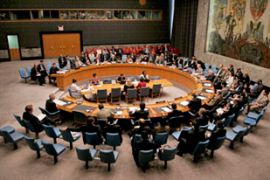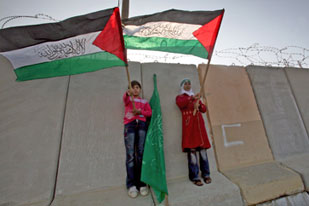UN adopts Middle East resolution
Resolution calling for “intensification” of peace efforts adopted by council.

Giadalla Ettalhi, the Libyan ambassador to the UN, had criticised the resolution for not condemning Israel’s treatment of the Palestinians, which he described as “basically a crime against humanity”.
“Disregarding such practices is an invitation to continue such behaviour,” he told the council.
Ettalhi had wanted the resolution to mention the Israeli blockade of the Gaza Strip and Israeli settlement building in Palestinian areas.
Al Jazeera’s Kristen Saloomey at the UN said that many people saw the vote as an attempt to secure some sort of legacy on the Middle East for George Bush, the US president, and Condoleeza Rice, the US secretary of state.
Bush leaves office on January 20, when Barack Obama, the US president-elect, will take over as president.
The vote took place at a high-profile ministerial session attended by Condoleezza Rice, Russian foreign minister Sergei Lavrov, British foreign secretary David Miliband and UN chief Ban Ki-moon.
‘Fulfilling obligations’
The council had met in an emergency session on Saturday to receive the US and Russia-sponsored resolution.
 |
| Palestinians have little faith that the UN will improve their situation [EPA] |
The text called on Israelis and Palestinians “to fulfil their obligations” from talks begun in the US city of Annapolis, Maryland, last year, and for all nations and international bodies “to contribute to an atmosphere conducive to negotiations”.
The meeting was announced on Friday by Zalmay Khalilzad, the US ambassador to the UN, and Vitaly Churkin, his Russian counterpart, who both said the draft resolution was aimed at moving peace talks forward.
“The purpose would be to support the progress that has been made in the peace process and to encourage the sustainment and the successful conclusion of achieving the two-state solution and the Annapolis principles,” Khalilzad said.
Talks between Israel and the Palestinians have been stymied by ongoing violence, disputes over illegal Jewish settlement-building on Palestinian land and the future of Jerusalem, which both sides claim as a future capital.
Arab leaders also fear that the election of a right-wing, hawkish leader in Israel in elections in February could hamper the peace process further.